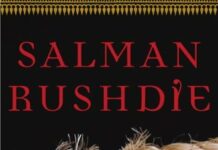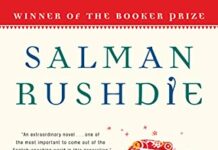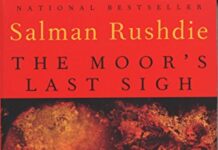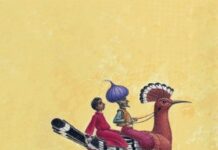
Ebook Info
- Published: 2012
- Number of pages: 338 pages
- Format: EPUB
- File Size: 1.88 MB
- Authors: Salman Rushdie
Description
Flapping Eagle is a young Indian given the gift of immortality after drinking a magic fluid. Tiring of the burden of immortal life he sets off to find the mystical Calf Island, where he can rejoin the human race. His journey is peopled with strange assortments of characters, including the clumsy, loquacious Virgil Jones; his ugly, tragic companion, Dolores O’Toole; the wicked conjurer, Nicholas Deggle; the dainty, light-spirited Elfrida Gribb; and the enigmatic, pervasive Grimus, creator and controller of the mysterious island.An enticing combination of science fantasy, storytelling and folklore makes this first novel by Salman Rushdie an epic adventure truly unlike any other.
User’s Reviews
Reviews from Amazon users which were colected at the time this book was published on the website:
⭐Thrilled to have this book. It came well wrapped and very quickly. The condition was better than rated. Very happy with this purchase.
⭐After reading “The Tiger’s Wife” and being recovering from that disappointment, I found great comfort reading “Grimus: A Novel” by Salman Rushdie.I generally love Rushdie and this book enforced that conviction. It involves travel between dimensions, immortality, gorfs, and anagrams. It was fun to rearrange letters to determine that gorfs were like frogs and that there is a cool anagram for dimensions, milky way universe and earth. What anagram does GRIMUS represent?This book revolves around immortal Axon amerindian “Flapping Eagle” and his desire to age and find a home. Via a con man, he travels through dimensions and universes to arrive at Calf Island washing up behind the rocking chairs of Delores O’Toole and Virgil Jones. She is a grossly ugly petite hunchback and he is an obese lunatic genius. See why I LOVE Rushdie???The adventure begins when Flapping Eagle and Virgil decide to go up the mountain into the Town of K. It is delicious, complex, thought provoking and keeps you on your toes as you read.Okay as you can tell this is great book…wonderful descriptions, incredible insights, and complex characters. Oh did I mention that there is whore house in the town of K?Themes include the price of mortality and definitions of morality. What makes a good person a good soul? What should Flapping Eagle do when he arrives at the top of the mountain and faces Grimus? (Trust me that is a crucial theme that is deeper than what I stated)
⭐I managed to get through this whole novel, but found it somewhat tedious at the best of times. The writing sounds rather tired and mechanical, as though Rushdie is getting bored with his talent.I was also distracted by the irrelevant sexual content. Much of this read more like the ludicrous fantasies of a teenage boy than the deep character and behaviour development one might expect from Rushdie. The ending is quite ridiculous, more like the ending of a Mills and Boon.This novel could be taken as something of a parody of post-modern life. The characters are so determined to avoid the truth that they become increasingly and frantically occupied with whatever is at hand. Facing the truth kills them. But Rushdie presents no truth but oblivion, which is embraced happily by the hero. If this is what Rushdie is trying to communicate, it seems no wonder that it is rather uninspiring.Technically, this is, of course, masterfully written. It is worth reading if only for the skilfully woven storyline and imagery. But if you’re looking for something with a positive message, look elsewhere.
⭐I have read a number of Salman Rushdie books over the years. I also have seen shorter pieces. I enjoy his work. This is an exception. I suppose great writers decide to try different approaches. For me, at least, it didn’t work. From what I have read about the book, I think the problem I have is mostly due to my lack of sophistication. However, I am not a student like the one who annotated the used copy I purchased. I read for pleasure. I found this book difficult. I am testing myself by following a book called 1001 books to read before you die. This one is like eating vegetables because it is good for you.
⭐My favorite Rushdie book, not as frenetic or as grand in scale as his later works, but strange, trippy, and deeply funny. A light, fairly easy read that pays off.
⭐There are few living writers that gain immediate recognition as true artists in their time, along side Pynchon, DeLillo, and perhaps Vonnegut, is Salman Rushdie. Before The Satanic Verses and before the fatwa there was Grimus.The first impression of this book, gleaned from the initial 50 or so pages is that we are face to face with an unrefined Rushdie. His penchant for dabbling in mythology, spirituality, canonical literal echoes, and Joycean word play are on full display. Being his first book, I was surprised that someone would pick up such chaotic prose as an author’s debut. But trusting the author, I stuck it out. I’m glad I did.Our protagonist, Flapping Eagle�who also goes by the names Born-From-Dead and Joe-Sue in the first handful of pages�essentially has been given the “gift” of eternal life. Staying the same age for hundreds of years, Flapping Eagle decides he no longer wants to live, but to finally die a mortal’s death. He has to go to Calf Island and ascend Calf Mountain to meet Grimus, much like a mythological Wizard of Oz. That’s the premise.Along the way, Flapping Eagle befriends Virgil Jones and his lady, Dolores O’Toole. The disfigured couple are the first clue that something is dreadfully wrong on Calf Island. Jones the obese is with O’Toole the humpback. The two really are remarkable and Rushdie gets lots of mileage from the two, creating a sympathy for them that never ventures into pity.A host of characters and themes are introduced, mythology has served Rushdie well and one gets the impression that Joseph Campbell would have enjoyed the playfulness and overlapping of Native American and Asian-Indian concepts. As we grip this overlap, Rushdie sends Flapping Eagle to find Grimus with Virgil Jones as his guide, echoing Danté.Details quickly pile up and the writing veers in unforeseen directions. Any balance that we grasped in the first chapter is taken away in the second. The only thing that kept me reading was trust in the author. Lost as I was, I knew I was being taken on a voyage by a master, who, in his first novel, was clearly establishing himself as a master.As obtuse as the second chapter was, then, the third chapter was very, very clear. Seemingly meaningless details from hundreds of pages prior came to make sense. Interruptions in the story, now had their place. Masks were removed. Tales were told. Resolution came into focus.Reading Grimus is, in some respects, like putting together a puzzle. The first chapter involves turning all of the pieces face up so we see what we have to work with. The second chapter relies on our powers of observation to not only look at the pieces but, at least try to fit them together. The third chapter leaves us with about 50 pieces left of a well-defined picture and we can race to the finish line, putting everything in place. In the end, you should have seen it all along.The greatest praise I can heap on this book is this: Rushdie teaches us how to read it. Like every great master, Rushdie has the ability to take us out of our own world, disorient us, and reorient us in a way that is not unsettling, but engaging. In the end, we feel smarter and more open minded.Grimus should really, in hindsight especially, get a lot more attention than it does. Rarely does a writer enter the scene so accomplished and well rounded as Rushdie does with this work. Although it is his first, it certainly is better than some of his other fares, and that alone should sell you on this book.
⭐Bernard Shaw ends the postscript to ‘Back to Methuselah’ with the words ‘It is either a world classic or it is nothing’. I suspect such a comment could, with some accuracy, be applied to Salman Rushdie’s ‘Grimus’.This eclectic story deals with immortality, created worlds, surreal things and other dimensions as it follows Flapping Eagle, a young Indian who receives the gift of immortality after drinking a magic fluid. He wanders the earth for 777 years 7 months and 7 days, searching for his equally immortal sister until, having fallen through the hole in the Mediterranean Sea, he arrives in a parallel dimension at the mystical Calf Island. The inhabitants are blessed with immortality, bored with the sameness of life yet reluctant to give up existence in a static community under a subtle and sinister authority rooted in the Grimus effect.There’s also the Gorf, an alien from a planet of game-obsessed rock-type things.The book contains some complicated philosophical aspects (the inhabitants are aware their world is only one of a series of alternative worlds) but, by the time I reached the end of the book, I couldn’t avoid concluding that Salman Rushdie – although a clever writer – is less than competent when it comes to science fiction.As another reviewer has, perhaps accurately, observed “Such lush prose, such splendid imagination – and such a wasted opportunity.”I haven’t read any of Salman Rushdie’s other books. Perhaps I should try ‘Midnight’s Children’.
⭐great thank you very much indeed
⭐I loved this book, Rushdie is an amazing writer and I didn’t know this book and am so glad I discovered it. Highly recommended,
⭐A toutes choses malheur est bon. Si Salman Rushdie n’avait pas connu la notoriété que lui a valu les « Versets sataniques », personne n’aurait pensé à exhumer son premier roman « Grimus » pour le relire, et ce serait dommage, car pour un coup d’essai, ce fut un coup de maître. Écrit au départ pour un concours littéraire de « Science-fiction », plus tard reconnu comme un chef-d’œuvre du nouveau roman, étiqueté « réalisme magique » dans sa variante « post-coloniale », qui le fit figurer à côté des œuvres de Günter Grass ou de Garcia Marquez, le livre fut mal accueilli à sa parution, confirmant les craintes de son éditeur qui en avait déprogrammé la publication. « Manque de cohérence, Trop ambitieux.» disent les critiques. « Trop ésotérique » aussi. Car, pour le décrypter, il aurait fallu en posséder les clés, que l’auteur livrait ainsi dans “Imaginary Homelands” (1) et dans “Is nothing sacred?” (2):(1) “The word “translation” comes, etymologically, from the Latin for “bearing across.” Having been borne across the world, we are translated men. It is normally supposed that something always gets lost in translation; I cling, obstinately, to the notion that something can also be gained.”(2) If religion is an answer, if political ideology is an answer, then literature is an inquiry; great literature,by asking extraordinary questions, open doors in our mind…”Translation et questionnement en sont donc les deux clés.Translation, ou le paradoxe du multiple dans l’Un, est la première clé, C’est le thème de l’homme transculturel, aux identités multiples, thème majeur qu’on retrouve par la suite dans ses romans, caché ici sous l’anagramme Grimus=Simurg,, figure de la mystique Soufi dans le “Cantique des Oiseaux”, poème initiatique de Farîd od-dîn ‘Attâr, quête de la Voie vers l’Un à travers le multiple.L’effacement des limites du réel et du fantastique, du passé et du présent est une constante de ce roman. Dès le début, il est question d’un élixir d’immortalité qui permit au héros de briser les barrières temporelles et spatiales, lui donnant la possibilité d’explorer au cours des 777 ans de vie les multiples facettes de l’existence, le mythe servant ici de moyen pour disloquer l’histoire de son cadre chronologique afin d’en tirer sa signification profonde, et pour disséquer les êtres afin d’en extraire ce dont ils ont en commun, la conscience collective. « He was the leopard who chanced his spots, he was the worm that turned. He was the shifting sands and the ebbing tide. He was moody as the sky, circular as the seasons, nameless as glass. He was chameleon, changeling, all things to all men and nothing to any man. He had become his enemies and eaten his friends. He was all of them and none of them.”C’est ainsi qu’est décrit le héros, un jeune Américain Indien qui porte en lui le poids de deux cultures. Parce que sa mère mourut en le mettant au monde, on l’a d’abord appelé “Born-from-dead,”puis “Joe-Sue” en raison de l’incertitude quant à son sexe, et enfin “Flapping Eagle”, prédestiné comme le veut la légende, à rejoindre Simurg, roi des oiseaux. Et quand cet improbable caméléon s’exprime, c’est à la fois à la première et troisième personne du singulier, car il est, comme Saladin Chamcha dans les « Versets sataniques », un cocon vide qui peut héberger mille identités différentes, ce mimétisme lui conférant non seulement le rôle de lien/osmose entre tous ceux qui l’approchent, mais aussi de point de jonction entre les mondes possibles, entre passé, présent et futur; entre ici et ailleurs, révélant l’envers et l’endroit de toutes choses: “the Gorf knew, when he saw Flapping Eagle, that this man was the link». Mais en assumant ce rôle fédérateur, il devient fatal pour tous ceux qui l’approchent dans la mesure où il les “déconstruit” pour en extirper leurs potentialités sous des identités de façade, à l’instar des postmodernes qui déconstruisent l’écriture. Chez les hommes qu’il cocufie systématiquement, il débusque leur fragilité et leurs turpitudes cachées sous le masque de la maîtrise de soi et de la fermeté. A leurs femmes débauchées, il leur révèle leur désordre intérieur caché derrière l’ordre moral affiché. Après avoir séduit Irina, la femme du notable local, en pensant tout haut à Elfrida sa prochaine conquête, il amalgame dans un lapsus révélateur –Elfrina- les noms des deux femmes, montrant par là que toutes choses et leurs contraires, apparemment inconciliables, se transmutent et ont de tout temps cohabité, car elles ne relèvent somme toute que du collectif. Après ces exploits, il devient naturellement le Paria de tous. Le Paria n’est-il pas celui qui, en mettant en présence les forces conflictuelles de la vie, sème la pagaille en opposant la raison à l’émotion, la rationalité à l’imagination?Rushdie semble ressusciter involontairement le débat qu’a ouvert au XIème siècle Al-Ghazali,lorsque dans son ouvrage «Tahafut al-falasif» traduit par « L’incohérence des philosophes »,le mystique Soufi prit le contre-pied du rationalisme aristotélicien, principalement représenté par Avicenne et Al Farabi, en exposant la doctrine Ash’ari selon laquelle l’univers n’a qu’une existence provisoire, soumise à la volonté de Dieu, qui n’en est pas seulement le créateur, mais aussi la cause de tout événement qui y survient, passé, présent ou à venir. Rushdie soulève la question, très souvent reprise dans ensemble de son œuvre, de la ré-écriture de l’histoire officielle, c’est à dire de la modification de l’emprise monolithique du passé (ou de Dieu) sur le présent à travers ses mythes, et de la nécessité d’une interaction de ce présent sur ce passé, en créant une« histoire alternative ». Ce faisant, il ne s’oppose pas à la théorie de la prédestination, ni ne prend parti pour celle du libre arbitre, mais se situe en deçà.Dans le roman, Axona, le pays natal du héros, n’est qu’une allégorie de l’Inde où, pour l’auteur, la religion n’a jamais représenté une vérité universelle dans la mesure où elle a été récupérée par le pouvoir politique. Virgil Jones, le guide de Flapping Eagle, lui disait: “An historian is affected by the present events and that eternally recreate the past.” L’auteur estime qu’il est possible de réagir contre l’immobilisme de l’Histoire unitaire en lui opposant le concept d’« Histoires multiples », en tant que suites des versions possibles de réalités, vues et vécues non pas d’un seul point de vue, mais d’une multitude de points de vues.“There are a million possible Earths with a million possible histories, all of which actually exist simultaneously.” dit un personnage de Grimus. « I do not care for stories that are, so tight. Stories should be like life, slightly frayed at the edges, full of loose ends and lives juxtaposed by accident rather than some grand design. Most of life has no meaning so it must surely be a distortion of life to tell tales in which every single element is meaningful » disait un autre.Rejeter l’histoire figée pour recréer une alternative, c’est exactement ce que fait Flapping Eagle quand, se révoltant contre son passé à Axona, il goute jusqu’à la lie ce sentiment d’isolement après avoir bu l’élixir d’immortalité. Sa nouvelle vie à l’ile de Calf n’est qu’une suite monotone qui n’a pour lui aucun sens. L’auteur suggère ainsi que les immortels n’ont pas d’histoire, parce que leurs vies, gouvernées par des lois divines, ne connaissent pas de variations. Flapping Eagle en attribue la responsabilité à Grimus, le maître de l’île et décide de l’affronter pour reconquérir son libre arbitre. Mais de libre arbitre, n’en a –t-il jamais disposé ? Grimus lui dévoile que ce n’est pas Flapping Eagle qui est venu le chercher, mais que c’était lui, le roi des oiseaux, qui ayant maîtrisé les mystères du temps et de l’espace, l’a fait venir dans sa retraite monastique en manipulant depuis le début le moindre de ses faits et gestes : “It is the cristal of potentialities. In it I can examine many potential presents and futures and dis cover the key moments, the crossroads in time, which guide us down one or the other line of flux.”Il lui explique que dans la vie de chacun, on est confronté à un choix lorsqu’on se retrouve au carrefour des mondes, là où les dimensions parallèles s’entrecroisent, et dès que le choix est fait, on s’engage dans l’un des mondes possibles, laissant ses doubles s’aventurer dans les autres mondes parallèles vers des destins différents. Le lecteur, à ce stade, est amené à se demander en aparté si lui même ne serait, à l’instar du héros, qu’un personnage de jeu vidéo, manipulé par un démiurge? Il y a effectivement dans les jeux RPG différents “endings”, bons ou mauvais selon qu’on ait choisi à un moment donné tel choix au lieu d’un autre. Grimus lui explique que l’ile de Calf est le monde idéal qu’il a sélectionné parmi tous les mondes possibles; “This is the Perfect Dimension, he said. In ather potential Dimension, you never came to Calf Island. In another, I never found the Stone Rose. In yet another, I continue to live, for ever, prisoner to my own ideas. But here, it must all be as I intended it.” L’ile de Calf est en quelque sorte le Nirvanâ recréé sur Terre où les humains sont enfin libérés de leur cycles karmiques: “This is the nature of Kâf: it is an attempt to understand human nature by freeing it from its greatest instinctual drive, the need to preserve the species through reproduction by stelerizing Recipients”. Ayant tout programmé, jusqu’à l’instant de sa mort même, il demande à l’élu de prendre sa succession, ce que l’autre refuse. Dans la confrontation qui s’ensuit, Flapping Eagle devient par osmose Grimus/Simurg, et vice versa, l’Un absorbant le multiple. Mais Eagle détruit la Pierre de Rosette qui assure la stabilité de l”Ile qui s’effondre comme un rêve inachevé, sous les yeux des Gorf, ces extraterrestres hyper-évolués qui ont un pouvoir d’imagination tellement fort qu’ils peuvent agencer à leur gré leur environnement. L’univers ne serait donc qu’un hologramme qu’ils ont projeté?Pour Rushdie, la littérature est un éternel questionnement, et aux réponses provisoires ne succèdent que de nouvelles questions. La pluralité des mondes de l’île de Calf renvoie à la pluralité potentielle du texte et aux multiples façons de l’interpréterb. Le texte n’est plus une inscription sur une page avec un sens unique, mais invite, avec ses diverses couches de perception, à mille façons de le lire. Chaque phrase, avec ses métaphores, chaque mots, avec ses anagrammes, déclenche de nouvelles perceptions venant d’autres références littéraires, créant ainsi des mondes parallèles d’interprétations possibles. Il ne faut pas donc s’étonner si le roman est truffé d’anagrammes, qui sont aussi une façon de réorganiser la réalité.Calf est l’anagramme de Kâf, qui est le nom dans la cosmologie islamique, de cette énorme montagne surplombant la Terre, et où seuls habitent les Djinns. Thera= Terre; La galaxie où habitant les Gorfs= Frogs parce qu’ils ont l’apparence de crapauds, Yawy Klim =Milky Way dans le Nirveesu= Universe; Nus =Sun; et on se surprend parfois à chercher des anagrammes là où il n”y en a pas. Vertigineux!5 star
Keywords
Free Download Grimus in EPUB format
Grimus EPUB Free Download
Download Grimus 2012 EPUB Free
Grimus 2012 EPUB Free Download
Download Grimus EPUB
Free Download Ebook Grimus





